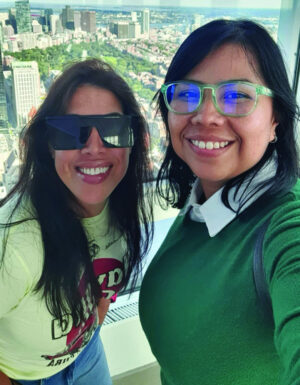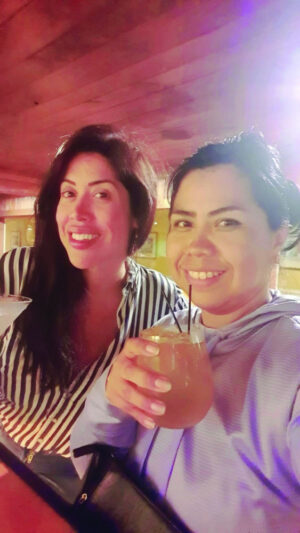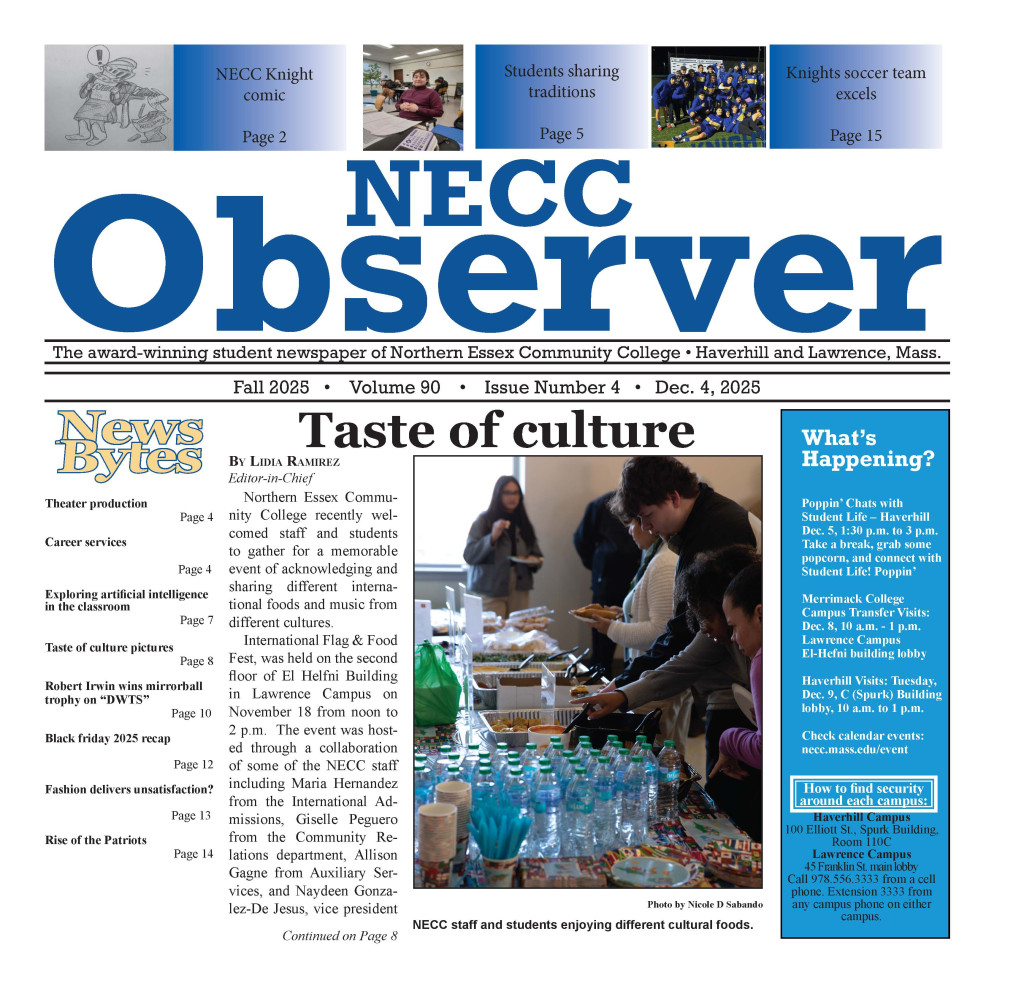
NECC students are connected with international peers virtually to team up on projects together. There are around seven courses with a special component, the International Virtual Experience IVE and Collaborative Online International Learning COIL where NECC students are paired with students at universities from Canada, France, Mexico or Palestine, to work as a team on an assigned project.
NECC students, the same as their international peers, consider these courses as highly valuable and open-door to thinking globally.
Learning globally from class
Courses like Physiological Chemistry and Anatomy and Physiology are required courses for most AS programs in Health Sciences. Professor Emily Gonzalez is the leader of both. She is leading this spring her third cohort of NECC students in a project with UIT Cachan of the Université Paris Saclay in Cachan, in the southwestern of France.
Also, Professor Gonzalez currently is teaching Anatomy and Physiology I collaborating with medical students at An Najah National University of Palestine in a discussion on environmental toxins. This collaboration was repeated with students in Physiological Chemistry in fall of 2023.
On the other side, Professor Lis Espinoza also teaches courses Spanish SPAN111 and English Composition ENG102 with COIL projects with peers in Mexico.
Professor Sheila Muller who teaches Principles of Marketing MKT210 and Entrepreneurship BUS102 with the IVE component, says “these exchanges give our business students a first-hand glimpse into working with diverse and international teams once they start their career paths in the global marketplace. It is a perfect microcosm for them to navigate their cultural profile, values, norms, and beliefs to better communicate with other cultures.”
Indeed, one of Muller’s students, Rosa Conn who will soon be graduating and transferring to a 4-year university, and was paired with students from Mexico confirmed “as a business major, I truly believe that this connection that we do with other (international) students is going to train us for the business world. For example, if we have a meeting in China or Mexico, in this program (IVE), we learn to understand that everybody works in a different way. We learn how other people do meetings, how they handle work/life differently like we do here, in the States.”
Professor Judith Pollock-Ciampi teaches managerial business communications with the IVE componet which is a capstone course that provides global awareness to students. Students learn about multicultural and generational communications. She said that it aligned with the college’s Strategic Plan, and helped students become more informed global citizens for the 21st century workforce.
International teamwork
Students are exposed to teamwork with peers from universities overseas and learn about the other student culture, about others countries points of view, and adjust each other timetable to come out with the assignment results. According to the feedback from the Center of Business, NECC business students and their French peers had exceptional team collaboration.
Managerial Business Communication students were paired with computer science students from Polytech Nancy, Université de Lorraine in France. One student emailed the professor this review after the course was finished. “It was helpful to have experience working with people on the other side of the world. The French students gave us a wonderful first experience with working with people from different cultures and this is sure to help me in the future.”
Another student of the same class, DS, emailed the professor that it was like opening a window to the world. “You get to chat with and collaborate with students from different countries… We’re not just learning about cultures in a textbook; we’re living it, working with people who see things from a totally different angle… It’s a journey that broadens our mind and connects us with awesome students from around the world.”
As professor Gonzalez said “students at NECC will be working with a diverse population with many cultural backgrounds and while we have much in common, there is much we can learn to understand at the verbal and non-verbal level when we communicate with each other. This can lead to efficiency and a better atmosphere in the workplace.”
Improving your resume
Professor Muller and Professor Ciampi provide a paragraph for students to use on their resumes. Other professors teaching similar IVE courses provide a special certificate. In both cases, this extra international component differentiate them for having worked/study with students abroad and successfully achieved their assignments. This may lead their names up to the top list for a job position or promotion.

Connections that transcend the classroom
Probably, the most important for Rosa Conn, NECC business student and Ailyn Diaz Torres, a master’s in business administration student from the Universidad Autónoma de Ciudad de Juarez, was the friendship beyond classes.
Diaz Torres said “I think it was great to be in contact with international students and learn about their points of view on the same topics. It was interesting to find similarities and contrasts between both countries. We found things that happen in the south of the USA and could happen in the north of Mexico.”
From Ciudad de Juarez, Diaz Torres added “I loved to meet Rosita, as I learned about her story, a Mexican girl who is studying and managing her own business at the same time. We continued being in touch after the course ended, and I told her I was interested in her business experience. I told her I would love to travel to Boston and visit her someday to learn more about her business. During last summer, I asked her if my son and I could visit her, and Rosita happily agreed. Once there, Rosita took me to all her business processes, marketing, logistics, management. I learned a lot about her entrepreneurship but beyond that, I met an amazing human being. So, what I liked the most about this course was the connection with another student from another part of the world.”
As Diaz Torres is an MBA student, working as a high school teacher, and with four kids, her possibilities to study abroad are limited. However, having the opportunity to be paired with international students virtually to teamwork on a study project and making friendship beyond classroom, “that only happened, that only could happen, through this course,” said Diaz Torres.
They have built a lifelong relationship. Conn is planning to return the visit and travel to Ciudad de Juarez, Mexico, to visit Diaz Torres soon.
These courses are a great opportunity to broad students’ way of thinking and give different perspectives about the world. It is fascinating to meet people from different cultures and backgrounds, finding similarities and challenges between both and most importantly, having the chance to work with an international cohort from your NECC classroom.
Furthermore, the Director, Instructional Technology & Online Education at NECC, Melba Acevedo, explains that IVE/COIL courses “give the students the opportunity to exchange experiences with students outside of the not just the local community, but even outside the country. By these opportunities, students will be able to expand their perspective, see things from other people’s point of view, and outside of the U.S. bubble.”
Acevedo points out these courses are not “cookie cutter” as they vary from semester to semester even with the same faculty members. When asked about how students manage the communications across borders considering different time zones, she explained it’s different per case. “It’s the beauty of the faculty when they put (it) together … and they do it according to what they feel comfortable with technology and what is feasible,”she said.
Students use different communication tools to talk to each other, including emails, Google Meet, Zoom, Discord, WhatsApp and even Face Time.
A call for students eager to check which courses are available for next semester with the International Virtual Experience component, same as faculty willing to collaborate with professionals all around the world, please contact Melba Acevedo at macevedo@necc.mass.edu

